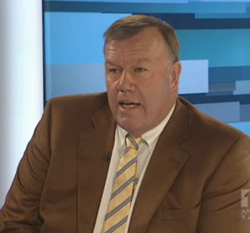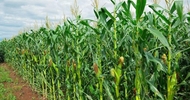How much foreign investment is too much?
Senator Bill Heffernan and the managing director of the Australian Agricultural Company David Farley join The Business to discuss overseas investment in Australia.
► Watch the 10 minute video online
TICKY FULLERTON, PRESENTER: I'm joined from Canberra by Senator Bill Heffernan and the managing director of Australian Agricultural Company David Farley.
Gentlemen, welcome.
DAVID FARLEY, MD, AUSTRALIAN AGRICULTURAL COMPANY: Welcome, Ticky.
BILL HEFFERNAN, LIBERAL SENATOR, NSW: G'day.
TICKY FULLERTON: Now Bill Heffernan, if I could come to you first. Why are sovereign-owned funds in particular different from other foreign investors?
BILL HEFFERNAN: Well I have to say we go - have to go back to the Foreign Investment Review Board Act for a start. It is a thing of the time of telegrams. The foreign - for the purpose of the act, urban land includes the Kimberleys, the Simpson Desert and yet a market garden at the back of Mascot Airport is agricultural land. I mean, the act is out of date.
What we need to know is what's going on. We do not know what's happening now. There are no - there is no penalty for not self-reporting. The new animal on the block is sovereign investment. Foreign investment's been part of Australia's history back to (inaudible) ...
TICKY FULLERTON: Why do you feel from a food security point of view we should feel threatened by sovereign investment?
BILL HEFFERNAN: Well the first thing we need to know before we think about that, which is what this committee's all about and I'm not going to pre-empt its findings and I can't do this in a couple of minutes, is to find out what's happening now, which we don't know.
Find out through modelling it where that's going to take us and then decide whether that's where we want to go and that's got to be seen against the 50-year snapshot of the global food task. I mean, by 2070 China needs to feed half of itself from someone else's population. They're onto it.
TICKY FULLERTON: Yes. Well there is a concern about this: people pulling out China as an example as opposed to anyone else, but you made the point there about what their demands may be. David Farley, do you agree with the concern about sovereign funds? Grocon, for example, the Queensland fruit and vegetable growers, they're worried about sovereign funds because they don't sell on the open market.
DAVID FARLEY: No, I don't think we've got a problem. Australia's built on the investment of offshore funds. Sovereign funds are just a new form of capital coming into the market.
TICKY FULLERTON: Well AACo was built on...
DAVID FARLEY: Exactly. We were the original of the foreign investments into Australia. I think Bill's point is pertinent, though, is that is Australia current and contemporary with the move into soft commodities? No, it's not. And there is an opportunity now to at least start a register and understand where the funds are and what they're going. But do we need those funds to develop our agricultural land? Definitely. Do we need them to support the land values and assets? Definitely. And do - does that investment help underwrite the food security of further nations? Definitely.
TICKY FULLERTON: You were, David, in China recently I think speaking to funds like this. What is it that they're looking for in an investment in Australia?
DAVID FARLEY: Well there's two things they clearly look for. One is a hedge itself. It's a great hedge against inflation. And then the other one is they're looking for the ability to be able to invest in supply chain managements, all the way through, and then more importantly, invest in and understand better management and better technologies.
TICKY FULLERTON: So, when you hear that, Bill Heffernan, does that worry you that they are looking for supply chains to actually come through?
BILL HEFFERNAN: Well, I mean, Australia's got 82 per cent of its pre-packaged market tied up in Coles and Woolies, which is doing a lot of damage to the producers in Australia. If you tie up the supply chain and vertically integrate it and if you do it in a way that takes them out of the tension of the supply into market here and delivers back to - from one sovereign asset of a sovereign nation back to the sovereignty, you can actually bypass under the present regulations the tax system, you can transfer price and, I mean, there are no penalties. I mean, the regime for reporting is self-reporting and if you don't self-report and you do the deal and get away with it, there's no penalty.
TICKY FULLERTON: One of the things, Bill, that kicked off your inquiry was when Shenhua bought those 47 farms in fairly fertile country for under the threshold, $230 million. But is that not more about land use? That was coal seam gas - that's what some people argue - than foreign investment?
BILL HEFFERNAN: Well I guess you've got to see this in the context of the fact that China for instance set aside 200 million hectares 10 years ago as an agriculture resource. They've already lost 10 per cent of that, 20 million hectares. What happened which Shenhua: they paid up to four times the real value to shut the farmers up that were adjacent to the mine. That in turn feeds onto the valuer general's value for the mean sales across the shire. That in turn feeds onto the shire rates. You can actually, as they did with the home investment market with Foreign Investment Review Board in Sydney, distort the market. But you can also distort the supply and demand market. But the first thing we've got to do, Ticky, is understand what's happening now and we don't know that.
TICKY FULLERTON: Well you've both said that. David Farley, you also say I don't think Australia "gets" food security.
DAVID FARLEY: No, not compared to the rest of the world. Anyone who visits South East Asia, the Indian Subcontinent - anywhere around the world, there's a real focus on food security. And they can quickly - anyone can quickly quote you the supply/demand demographics.
What Australia needs to do is - we're fortunate, we're affluent in these assets - is understand the responsibilities of the sovereignty of these assets and making sure that we've got them into production and meeting the regional and especially the immediate needs of our neighbours to be able to feed them comfortably and not put them in stress.
TICKY FULLERTON: Your submission to this inquiry, the AACo's submission, was supportive on foreign investment, but you were actually quite concerned about the ownership of what one might call "export gateways", things like ports, mills, cotton gins, that sort of thing. Why?
DAVID FARLEY: They're the assets that actually engage with the price-making for the producer into the international marketplace, so it's important that they actually deliver the right signals back to the market so we're getting the right responses of the agricultural production and the use of the land. So, we can't afford to lock ourselves away in closed supply systems. We must be able to respond to the supply and demand internationally.
TICKY FULLERTON: Bill Heffernan, if you were in China or Indonesia and you wanted to secure food supply, why wouldn't you just subsidise buying food on the open market?
BILL HEFFERNAN: Well, I mean, Craig Emerson has said to me that the Chinese first preference is to tie up long-term supply rather than acquire the means of production. Rather, they'd like to tie up the production. But I have to say we've come across in these hearings so far - I mean, for some pretty fancy schemes. One scheme I won't name the sovereignty, but a sovereignty was prepared to lend a company a 30-year loan to bring them into Australia and after 30 years, interest free loan, the asset reverts to the sovereignty. Well, those sort of things we need to know about and understand where they're going to take us because without a doubt, by 2070, the world's going to be a different place and what's in your fridge is going to be far more important than what's in the garage.
TICKY FULLERTON: And our Export Control Act, which seems on first reading to have quite a lot of teeth, won't be enough.
BILL HEFFERNAN: The Foreign Investment Review Board and the national interest test, as evidenced in the inquiry the other day with John Phillips, is laughable.
TICKY FULLERTON: Alright, David?
DAVID FARLEY: Well, we've exercised that security before. We've done it through the periods of war where we've actually demonstrated we can control and direct our product where it needs to go. But I think Bill's point is correct, is that we need to bring our systems up to more modern and contemporary standards. We need to start addressing: what are we doing with our assets? How are we going to develop our assets? And how are we going to develop our agricultural industry? And this is capital that's willing to invest into these assets and do it immediately.
TICKY FULLERTON: Let me move to the other half of the asset along with land, which is water. We've got Basin families now descending on Minister Tony Burke and screaming about more buybacks. Are we ever going to get a resolution in the Murray-Darling, because that is absolutely key, David Farley, to our production, isn't it?
DAVID FARLEY: Well, it's been an interesting debate, a debate taken over the correct tenure of time. We've seen a record-breaking - a record drought and we've also seen record-breaking floods and rains. So, it's good that we haven't resolved it. It's giving people a chance for people to see both ends of the horizons that agriculture - irrigation agriculture operates under. But I think the most important thing we do now is that we put certainty to it. Because all of the agricultural supply problems in 2008 that created the great spike in commodities, haven't gone way. They've mellowed, but they're - underlying, they're still there.
TICKY FULLERTON: Bill Heffernan, just a few minutes left, but one uncertainty which seems to have arisen appears to have been possibly new allocations of sub-surface water given to the coal seam gas industry. Now that's another inquiry you've been running.
BILL HEFFERNAN: Well there's no real explanation thus far for the logic behind that allocation of 2,700 gigs of new groundwater. They say some of it's found. I mean, this is a great unknown. The science for coal seam gas - I mean, if we can sort the science out, we can sort the industry out. The science is not sorted out. There are some companies that are going to have serious problems with millions of tonnes of salt and a lot of brine with no safe storage and no purpose for the salt. But I have to say those ladies that were down in Canberra today, I said to them, I mean, rather than go through all the political who-ha where no-one's trying to damage themself for the next election, why don't we talk about the science of the future and the efficiency of water use? For instance, they now have developed non-paddy rice...
TICKY FULLERTON: Bill, I'm gonna have close you down. (Laughs).
BILL HEFFERNAN: I know, I know, it's difficult.
TICKY FULLERTON: The science of the future - we'll end there, but thank you very much, Senator Bill Heffernan and David Farley from AACo.
BILL HEFFERNAN: My great pleasure.
DAVID FARLEY: Thanks, Ticky.
TICKY FULLERTON: Thanks for joining us.














